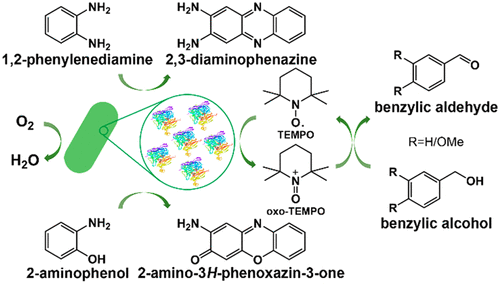当前位置:
X-MOL 学术
›
ACS Sustain. Chem. Eng.
›
论文详情
Our official English website, www.x-mol.net, welcomes your
feedback! (Note: you will need to create a separate account there.)
Biocatalytic Oxidation of Aromatic Compounds by Spore-Based System
ACS Sustainable Chemistry & Engineering ( IF 7.1 ) Pub Date : 2020-08-11 , DOI: 10.1021/acssuschemeng.0c04884 Fei Peng 1, 2 , Bingjie Zheng 1, 2 , Yao Zhang 1, 2 , Aroosha Faheem 1, 2 , Yanyan Chai 1, 2 , Tao Jiang 1, 2 , Xuguang Chen 1, 2 , Yonggang Hu 1, 2
ACS Sustainable Chemistry & Engineering ( IF 7.1 ) Pub Date : 2020-08-11 , DOI: 10.1021/acssuschemeng.0c04884 Fei Peng 1, 2 , Bingjie Zheng 1, 2 , Yao Zhang 1, 2 , Aroosha Faheem 1, 2 , Yanyan Chai 1, 2 , Tao Jiang 1, 2 , Xuguang Chen 1, 2 , Yonggang Hu 1, 2
Affiliation

|
Enzyme-based catalyzed reactions are of increasing importance in organic synthesis as they are eco-friendly and allow a multitude of selective and efficient reactions in aqueous system. In this work, we used Bacillus amyloliquefaciens spores instead of laccase for organic synthesis because the former had plenty of CotA-laccase on their surface. The yields of spore catalyzed cross-coupling of substituted aromatic amines such as 1,2-phenylenediamine and 2-aminophenol to corresponding phenazine and phenoxazinone reached 70% and 85%, respectively. By coupling with TEMPO, a spore–TEMPO system was developed for the oxidation of primary benzylic alcohols such as benzyl alcohol, 4-methoxybenzyl alcohol, and 3,4-dimethoxybenzyl alcohol to corresponding benzaldehydes with excellent selectivity (99%, 98%, and 98%, respectively) and good yields (approximately 91%, 95%, and 96%, respectively). The developed spore-based systems show several advantages including eco-friendliness, ease of operation and storage, low cost, recyclability, sustainability, and no need for enzyme purification or immobilization. These findings may have promising implications for developing a new eco-friendly and cost-effective technology for organic synthesis.
中文翻译:

孢子基体系对芳香族化合物的生物催化氧化
在有机合成中,基于酶的催化反应越来越重要,因为它们对环境友好,并且允许在水性体系中进行多种选择性和有效的反应。在这项工作中,我们使用了解淀粉芽孢杆菌孢子代替漆酶进行有机合成,因为前者的表面上有大量的CotA-漆酶。孢子催化的取代芳族胺(例如1,2-苯二胺和2-氨基苯酚)与相应的吩嗪和吩恶嗪酮的交叉偶联分别达到70%和85%。通过与TEMPO偶联,开发了一种孢子-TEMPO系统,用于将苄基醇,4-甲氧基苄醇和3,4-二甲氧基苄醇等伯苄醇氧化为相应的苯甲醛,且具有优异的选择性(99%,98%和分别达到98%)和良好的收率(分别为91%,95%和96%)。已开发的基于孢子的系统显示出多项优势,包括生态友好,易于操作和存储,低成本,可回收性,可持续性,无需酶纯化或固定化。这些发现可能对开发一种新的生态友好且具有成本效益的有机合成技术具有潜在的启示。
更新日期:2020-09-21
中文翻译:

孢子基体系对芳香族化合物的生物催化氧化
在有机合成中,基于酶的催化反应越来越重要,因为它们对环境友好,并且允许在水性体系中进行多种选择性和有效的反应。在这项工作中,我们使用了解淀粉芽孢杆菌孢子代替漆酶进行有机合成,因为前者的表面上有大量的CotA-漆酶。孢子催化的取代芳族胺(例如1,2-苯二胺和2-氨基苯酚)与相应的吩嗪和吩恶嗪酮的交叉偶联分别达到70%和85%。通过与TEMPO偶联,开发了一种孢子-TEMPO系统,用于将苄基醇,4-甲氧基苄醇和3,4-二甲氧基苄醇等伯苄醇氧化为相应的苯甲醛,且具有优异的选择性(99%,98%和分别达到98%)和良好的收率(分别为91%,95%和96%)。已开发的基于孢子的系统显示出多项优势,包括生态友好,易于操作和存储,低成本,可回收性,可持续性,无需酶纯化或固定化。这些发现可能对开发一种新的生态友好且具有成本效益的有机合成技术具有潜在的启示。































 京公网安备 11010802027423号
京公网安备 11010802027423号